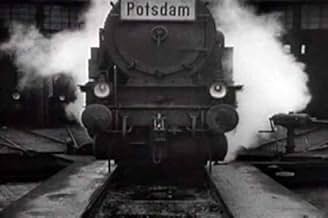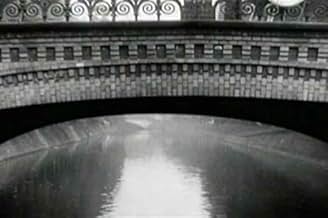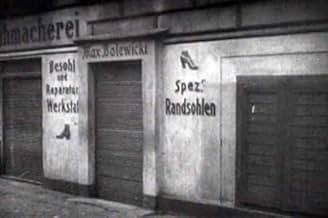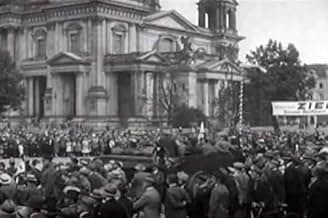Berlim - Sinfonia da Metrópole
Título original: Berlin - Die Sinfonie der Großstadt
AVALIAÇÃO DA IMDb
7,6/10
5 mil
SUA AVALIAÇÃO
Adicionar um enredo no seu idiomaThis movie shows us one day in Berlin, the rhythm of that time, starting at the earliest morning and ends in the deepest night.This movie shows us one day in Berlin, the rhythm of that time, starting at the earliest morning and ends in the deepest night.This movie shows us one day in Berlin, the rhythm of that time, starting at the earliest morning and ends in the deepest night.
- Direção
- Roteiristas
- Artista
Paul von Hindenburg
- Self
- (não creditado)
- Direção
- Roteiristas
- Elenco e equipe completos
- Produção, bilheteria e muito mais no IMDbPro
Avaliações em destaque
An amazing work of the 'slice of life' films of the 20s, really the main and most admirable example along with Dziga vertov's Man With the Movie Camera, to this day, the film remains an effective portrayal of the great city that Berlin was even back when the film was made. In fact, as time goes by, it picks up even greater importance because of the historical value that it holds.
What is truly admirable is the editing and the cinematography. Perhaps even more than the things that are contained in the framework, is the framework itself which has the first impact on the viewer. The wonderful photography, and the skilled editing that is able to go from man to machine, from trains to horses, from workmen to roller-coaster rids, are always elegant and original, even in regards to Vertov's later work mentioned above. It is, in fact, stylistically a Ruttmann work. Although the work of Vertov and Ruttmann are similar, there is a difference in the sense that while The man With the Movie Camera is aware of being a film, and plays with the process of film-making, Berlin actually lets the contents of the framework play out, and never quite interferes with it.
What is truly admirable is the editing and the cinematography. Perhaps even more than the things that are contained in the framework, is the framework itself which has the first impact on the viewer. The wonderful photography, and the skilled editing that is able to go from man to machine, from trains to horses, from workmen to roller-coaster rids, are always elegant and original, even in regards to Vertov's later work mentioned above. It is, in fact, stylistically a Ruttmann work. Although the work of Vertov and Ruttmann are similar, there is a difference in the sense that while The man With the Movie Camera is aware of being a film, and plays with the process of film-making, Berlin actually lets the contents of the framework play out, and never quite interferes with it.
Berlin: City Symphony is one of those early experiments in montage - early as in before sound was invented and right after Battleship Potemkin changed everything. It's not always montage, as some might believe from its recommendations (i.e. Koyannasquati), as the director Walter Ruttmann is making documentary as much as city-scape. It's about a full day and night among the dwellers and the objects of a city: the moving trains, the people shuffling by about their various concerns, and the people at jobs and things like a factory at work and phones being answered used for editing fodder.
Some of this is dazzling work, cut and speed up to reflect a mood of a city that is vibrant and hectic, imaginative and crazy, and sometimes tending for the dramatic. Ruttmann also has a rather weird design with the pacing at times; a woman in one 'scene' looks over a river, and in a state of sorrow falls over. People rush over to see what has happened, and we see a shot of the water and the woman gone under... and then it cuts right away to a beauty pageant! It throws a viewer off to see Ruttmann's unconventional choices, and how images flow together like the racers (cars, horses, people, boxcars), and there develops a simple but engrossing poetry of people as "actors" in front of a camera on their daily travels or having fun like at the funshow in the auditorium. It's not always as exciting or delirious as a Russian counterpart like Man with a Movie Camera or Kino Eye, but it pays loving tribute to its city at its time and place, showing the light with the dark, the commonplace with the unusual.
Some of this is dazzling work, cut and speed up to reflect a mood of a city that is vibrant and hectic, imaginative and crazy, and sometimes tending for the dramatic. Ruttmann also has a rather weird design with the pacing at times; a woman in one 'scene' looks over a river, and in a state of sorrow falls over. People rush over to see what has happened, and we see a shot of the water and the woman gone under... and then it cuts right away to a beauty pageant! It throws a viewer off to see Ruttmann's unconventional choices, and how images flow together like the racers (cars, horses, people, boxcars), and there develops a simple but engrossing poetry of people as "actors" in front of a camera on their daily travels or having fun like at the funshow in the auditorium. It's not always as exciting or delirious as a Russian counterpart like Man with a Movie Camera or Kino Eye, but it pays loving tribute to its city at its time and place, showing the light with the dark, the commonplace with the unusual.
This is a silent era documentary showing a day in the life of Berlin starting from the morning to the late night. It shows people and places in their day to day existence. It's artistic like showing the machinery at work. It's fascinating to see people in their everyday lives. It's amazing to see the places especially since most of them were destroyed in WWII. It's great to see living lives in this time era. This is a world in between the two Great Wars. The economic crash has yet to happen. It's a Germany which still functions with its old wealth and new technology. It's a working city. It's a great time capsule and a terrific movie by itself.
Place: Berlin. Span: one day in the life of the city circa 1927 captured by the camera. We enter by train.
One way to watch this, the most obvious I guess, is as a historic document, a snapshot of life as it was once. The old world just barely impregnated with faint traces of an archaic modernity; street cars, neon signs, busy streets, things we have now but were then just beginning to greet people. So with this mindset, as a museum piece that depicts an old version of our world.
This is fine, but I urge you to engage it differently if you can.
What if instead of merely observing exhibits from behind a glass panel, we get out from the museum into actual life? Instead of settling in for this as a historic - meaning dead, embalmed, academic - glimpse, we invigorate it with life that we know, with sunlight, texture, sound, breath that was then as real as it is now? How would it be in absolute stillness to feel present in the middle of a modern life?
This is how the film was intended after all, it's plainly revealed this way. Not a fossil for generations of curious tourists from the future, but a celebration of life 'now', modern, busy life out the window.
So no longer an old world that faintly reminds us of our own, but a new world, exciting, alluring, mysterious, alive with myriad possibilities. New things everywhere, novel pathways to travel, environments to experience. What I mean is, try to see the city as though you just got off the train and were visiting for the first time. It ends with the camera spinning around a flashing neon sign cut to match with fireworks erupting in the night sky.
I urge you to inhabit this, settle for nothing less. Let its neon flowers blossom in you.
One way to watch this, the most obvious I guess, is as a historic document, a snapshot of life as it was once. The old world just barely impregnated with faint traces of an archaic modernity; street cars, neon signs, busy streets, things we have now but were then just beginning to greet people. So with this mindset, as a museum piece that depicts an old version of our world.
This is fine, but I urge you to engage it differently if you can.
What if instead of merely observing exhibits from behind a glass panel, we get out from the museum into actual life? Instead of settling in for this as a historic - meaning dead, embalmed, academic - glimpse, we invigorate it with life that we know, with sunlight, texture, sound, breath that was then as real as it is now? How would it be in absolute stillness to feel present in the middle of a modern life?
This is how the film was intended after all, it's plainly revealed this way. Not a fossil for generations of curious tourists from the future, but a celebration of life 'now', modern, busy life out the window.
So no longer an old world that faintly reminds us of our own, but a new world, exciting, alluring, mysterious, alive with myriad possibilities. New things everywhere, novel pathways to travel, environments to experience. What I mean is, try to see the city as though you just got off the train and were visiting for the first time. It ends with the camera spinning around a flashing neon sign cut to match with fireworks erupting in the night sky.
I urge you to inhabit this, settle for nothing less. Let its neon flowers blossom in you.
10J. Steed
Classic and splendid film that is still fascinating to watch. Walter Ruttmann did not make a documentary about Berlin, although 75 after date it certainly can be considered a document about a Berlin that is no more, he composed a film that tries to catch the essence of the atmosphere of a big city. The film is a good example of the art style Neue Sachlichkeit (functionalism): it is a cross-section of Berlin's life in which every element is equally important, shown without comment and in its totality it is the expression of the joy of Berlin's life. It is not a film about the life of Berliners, it is Berlin seen as a living mechanism.
The subtitle referring to Großstadt (big city) is the key, it could have been any other city. The idea as such is not the makers' prerogative. Elsewhere the fascination with the hustle and bustle of the big city was also present as was the idea to catch this on this film and in music: e.g. Cavalcanti in France made a film about Paris and the US Ferde Grofé composed his musical suite Metropolis (1927) with New York in his mind. The irony of all these endeavours is that the film or music is abstract, but that the result is a romanticizing view.
Ruttmann made several abstract film and he refers to them in the beginning with abstract horizontal lines dissolving to rail way tracks. In my view the rest of the film is also abstract. Although we see real people and situations the brilliant editing constantly keeps the film abstract: the situation and the people in a shot are not important, important is the juxtaposition to other shots: is the composition varied enough?. Thus we see a filmic composition (in stead of a musical one) and the subtitle Symphony is just. As with every composition the theme has to be modulated to keep it interesting and it is here where the weakness of the film is. The building up from the start and elaboration up to the beginning of the afternoon is splendid, precise and exiting; but from that point it bogs down for a while: we see another shop, another street etc. without adding much to what already was. It may be that Ruttmann was aware of this, note how quickly he finishes the afternoon to continue with the night-life and then immediately all the excitement and filmic fun is back.
In an 1939 interview cameraman Karl Freund said that everything possible was filmed using only candid cameras. I have my doubts. Let's take for example the sequence of the drowning lady: how could he make an extreme close-up with a hidden camera in such a brilliant angle? (By the way: if she really tried to commit suicide, was Freund himself not only one of the gaping bystanders without doing anything to save her?) How could he foresee the right angle to film the prostitute picking up her client near the cornered shop window? Not that it matters for the quality of the film, but it proofs the old adagium: filming is deceiving.
The subtitle referring to Großstadt (big city) is the key, it could have been any other city. The idea as such is not the makers' prerogative. Elsewhere the fascination with the hustle and bustle of the big city was also present as was the idea to catch this on this film and in music: e.g. Cavalcanti in France made a film about Paris and the US Ferde Grofé composed his musical suite Metropolis (1927) with New York in his mind. The irony of all these endeavours is that the film or music is abstract, but that the result is a romanticizing view.
Ruttmann made several abstract film and he refers to them in the beginning with abstract horizontal lines dissolving to rail way tracks. In my view the rest of the film is also abstract. Although we see real people and situations the brilliant editing constantly keeps the film abstract: the situation and the people in a shot are not important, important is the juxtaposition to other shots: is the composition varied enough?. Thus we see a filmic composition (in stead of a musical one) and the subtitle Symphony is just. As with every composition the theme has to be modulated to keep it interesting and it is here where the weakness of the film is. The building up from the start and elaboration up to the beginning of the afternoon is splendid, precise and exiting; but from that point it bogs down for a while: we see another shop, another street etc. without adding much to what already was. It may be that Ruttmann was aware of this, note how quickly he finishes the afternoon to continue with the night-life and then immediately all the excitement and filmic fun is back.
In an 1939 interview cameraman Karl Freund said that everything possible was filmed using only candid cameras. I have my doubts. Let's take for example the sequence of the drowning lady: how could he make an extreme close-up with a hidden camera in such a brilliant angle? (By the way: if she really tried to commit suicide, was Freund himself not only one of the gaping bystanders without doing anything to save her?) How could he foresee the right angle to film the prostitute picking up her client near the cornered shop window? Not that it matters for the quality of the film, but it proofs the old adagium: filming is deceiving.
Você sabia?
- CuriosidadesThe shooting was done over 18 months though the resulting feature gives the impression of just one day in the city.
- ConexõesFeatured in Lulu in Berlin (1984)
Principais escolhas
Faça login para avaliar e ver a lista de recomendações personalizadas
- How long is Berlin: Symphony of Metropolis?Fornecido pela Alexa
Detalhes
- Data de lançamento
- País de origem
- Idioma
- Também conhecido como
- Berlin: Symphony of a Metropolis
- Locações de filme
- Hotel Excelsior, Kruezberg, Berlim, Alemanha(destroyed by Allied bombing April 1945)
- Empresas de produção
- Consulte mais créditos da empresa na IMDbPro
- Tempo de duração1 hora 5 minutos
- Cor
- Mixagem de som
- Proporção
- 1.33 : 1
Contribua para esta página
Sugerir uma alteração ou adicionar conteúdo ausente

Principal brecha
By what name was Berlim - Sinfonia da Metrópole (1927) officially released in India in English?
Responda



















